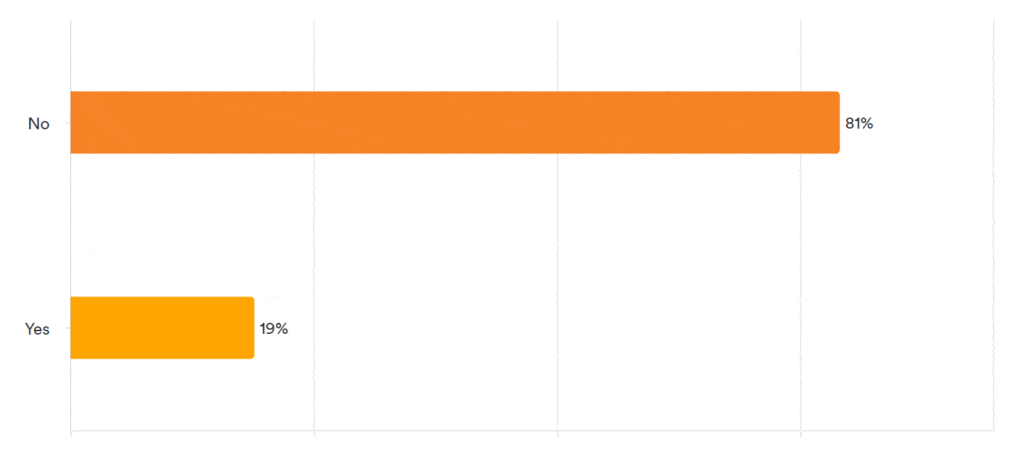According to the November LANDTHINK Pulse results, a substantial share of Americans won’t buy land in a place where the laws conflict with their political beliefs. An overwhelming number of respondents (81%) indicated that they WOULD NOT buy land in state that did not align with their politics. It’s a little less than one year until Election Day 2024 and we’ve all come to grips with the fact that this is shaping up as the most monumental presidential election in a decade. With never-ending campaigns, social media and 24-hour news cycles, it seems nearly impossible to escape political discussions. While some people enjoy arguing with those who have opposing viewpoints, others want to move to places with like-minded citizens where neighbors and communities share their political views.
Last month, the November Pulse asked: Would you buy land in a state with politics or policies you disagree with?

In 2022, a virus-weary American population yearned for greener pastures and wide-open spaces, and a LANDTHINK Pulse revealed that 39% of respondents indicated that their primary purpose for purchasing land would be to live or build a home on the property. While the United States is more racially and ethnically diverse than it has ever been, the communities many Americans live in are becoming less diverse, as people move to places made up of people who think and vote like they do.
There are distinct differences that are not inherently political in the sorts of communities that appeal to liberals and conservatives. Liberals tend to value ethnic diversity, public transportation, a vibrant arts scene, and tend to prefer more urban places. Liberals generally emphasize the need for the government to solve problems. Conservatives value patriotism, churches, limited government, individual liberty, traditional American values and a strong national defense. Conservatives generally choose rural areas when considering ideal places to live.
Political sorting is a very recent phenomenon, with many factors factors contributing to the movement. The trend started when conservatives began fleeing states with strict COVID-19 rules. Many businesses were forced to close over COVID-19 restrictions. Republicans opposed lockdowns, questioned the safety of the vaccines and did not support mask mandates. Now parents are selecting school districts that align with their preferences regarding critical race theory and other controversial issues. Political sorting has been happening for quite some time, and the United States is quickly coming to resemble two countries, one rural and one urban.
Residents have been fleeing states like California, New York, Connecticut and New Jersey with high taxes and expensive real estate and are heading to conservative strongholds like like Florida, Texas, and Idaho.
The split has sent states careening to the political left or right, adopting diametrically opposed laws on some of the hottest issues of the day like abortion and minors seeking access to gender-affirming care. Violent crime and unease is on the rise in Democrat-controlled cities across the nation. While violent crime isn’t exclusive to cities, people are seeking to exercise more control over the safety and security of their family by looking to purchase rural land for sale.
Per Census numbers, California lost nearly 350,000 residents in 2022, while New York lost about 300,000 and Illinois saw more than 140,000 go elsewhere. Other states, including New Jersey (-64,231), Massachusetts (-57,292) and Pennsylvania (-39,957), also saw large numbers of residents say goodbye.
But other states, such as Florida and Texas, saw large gains in population, with Florida adding an eye-popping 444,484 residents and Texas adding 470,708. Other population winners include North Carolina (99,796 residents added), South Carolina (+84,030), Tennessee (+81,646) and Georgia (+81,406).
When Americans move, politics is not typically the explicit reason. But the lifestyle choices they make place them in communities dominated by their preferred party. Nothing allows you to live out your personal values like buying and living on rural acreage.
Do you have a suggestion for next month’s Pulse question? Submit your question and we might choose yours!
This content may not be used or reproduced in any manner whatsoever, in part or in whole, without written permission of LANDTHINK. Use of this content without permission is a violation of federal copyright law. The articles, posts, comments, opinions and information provided by LANDTHINK are for informational and research purposes only and DOES NOT substitute or coincide with the advice of an attorney, accountant, real estate broker or any other licensed real estate professional. LANDTHINK strongly advises visitors and readers to seek their own professional guidance and advice related to buying, investing in or selling real estate.










I bought my land for this reason and the high taxes.